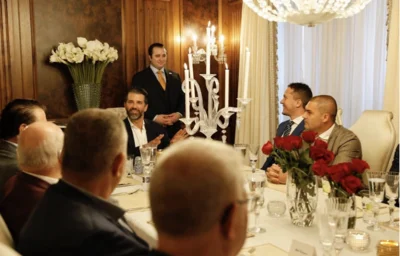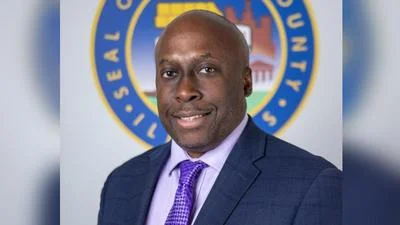Eli Steele, writer, editor, director and producer of the award-winning personal documentary "How Jack Became Black," about race in the United States, has a pretty good idea about the challenges mixed race individuals face.
"Perhaps the best way to answer that question is by personal example," Steele said during a North Cook News email interview. "When I went to register Jack, my multiracial son, at his local public elementary school in Los Angeles, I was surprised to learn that I had to reduce my son's complex identity to a 'Primary Race' box. There was no multiracial box or a check all that apply."
Steele said he later learned that schools with such forms will often place multiracial kids back into the primary race boxes behind the scenes. "There are people that argue that these boxes are meaningless and that I should just check them and move on," he said.

Eli Steele, writer, editor, director and producer of "How Jack Became Black"
"But, if that is true then why did America's second largest school district, Los Angeles Unified School District, refuse enrollment to my son unless a 'Primary Race' was checked? Why was his race more important than him walking through the school doors? And what value did these race boxes hold if my son essentially had to lie about his racial identity in order to check one? I use this example to show the absurdities multiracial people face when they encounter the forces of identity politics. W.E.B. DuBois said the color line would be a major battlefront. Multiracials themselves have blurred the color line and I believe the next battleground is identity politics."
That personal experience was the flashpoint for "How Jack Became Black," which New Trier Neighbors plan to present at 7 p.m. March 5 in New Trier High School’s Cornog Auditorium at 7 Happ Road in Northfield. Steele and his documentary have been featured on "Chicago's Morning Answer" and the "Shiznit Show" and has won the Anthem Film Festival awards for Best Libertarian Ideals Documentary Feature and Audience Choice Documentary Feature. "Chicago's Morning Answer" is co-hosted by Dan Proft, a principal in Local Government Information Services, which owns this publication.
Steele has a great deal of personal experience for his documentary about multiracial America, according to details in his online biography. Born in 1974, Steele's mother is Jewish and his father is black. Steele grew up in San Jose, California, earned his English degree from Claremont McKenna College and a master's degree in public policy from Pepperdine University. Today, Steele is a filmmaker living in Los Angeles.
Steele said he's observed quite a lot about U.S. culture in his time. "Over my lifetime, there has been a great shift in the culture wars from the individual to the race group," he said.
"I was born after the Civil Rights Movement and grew up in a time where the idea of being an individual was greatly valued. However, in the last 25 years or so, we have become mired in identity politics, an ideology that values our external markers over our individuality. We have seen the emergence of ideas like white privilege, racial equity and intersectionality, which push us back into race groups – the opposite of what my ancestors were fighting for during the Civil Rights Movement. What makes 'How Jack Became Black' timely is that it shows how identity politics affects us today and asks the question of whether or not it is still possible to move back toward the idea of the individual."
How things are now isn't how it always must be, Steele said. "I think we need to start by asking why we put identity politics before the individual," he said.
"Why have we allowed 'what' a person is to matter more than 'who' a person is? The race boxes themselves are meaningless. What gives these boxes their meaning are the powers behind the boxes. It was the same way under white supremacy. It was the white supremacists that gave the white and black boxes their meanings. So, today, we need to question the powers that make up identity politics and ask why they continue to segregate us by race. How is doing that making our society better?
Steele said he also is open to questions. "I am always open to discussing what the audience wants to learn more about," he said. "Some of my favorite discussions with the audience have revolved around the idea of identity politics as a racial order. People are surprised by this idea and understandably so. It’s a new idea and it has helped move the conversation away from the tired racial clichés we often become mired in."





 Alerts Sign-up
Alerts Sign-up